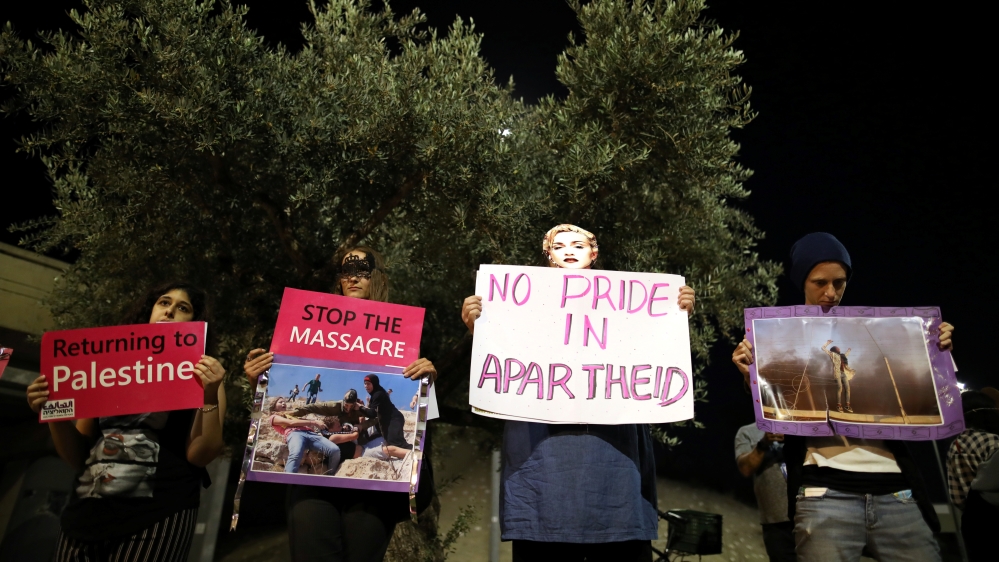Eurovision under way in Israel despite pro-Palestinian protests
The Eurovision Song Contest finals got under way in Tel Aviv, as Israeli police threw a high-security cordon around the venue, amid pro-Palestinian protests urging fans to shun the event.
Armed police stood at elevated positions around the Expo Tel Aviv complex on Saturday night, with patrol cars and police motorcyclists at junctions as fans passed through metal detectors and multiple security checks.
Pro-Palestinian groups including the Boycott, Divestment and Sanctions (BDS) movement have called on artists and the public to stay away from the 41-country international singing competition to protest against Israeli policies and human rights breaches in the occupied West Bank and Gaza.
No finalists or broadcasters have pulled out, but the organisers put security inside the hall in case activists try to disrupt the live televised final or performers hold an on-stage protest.
Al Jazeera’s Harry Fawcett, reporting from a pro-Palestinian demonstration in Tel Aviv, said that there had been regular protests and online campaigns against the event by pro-Palestinian groups, adding that Israel was trying hard to counter them.
He said: “Protesters’ point of view is that this event should not happen here at all. Attending Eurovision or supporting Eurovision is supporting Israel and its desire to divert attention from the realities of the occupation by portraying Tel Aviv as a liberal place.”
Madonna controversy
Pop star Madonna arrived in Israel earlier in the week, ahead of her planned guest performance.
Defending her decision to take part, the 60-year-old singer issued a statement saying she hoped to see “a new path towards peace”.
In a statement carried by US media earlier this week, Madonna said: “I’ll never stop playing music to suit someone’s political agenda nor will I stop speaking out against violations of human rights wherever in the world they may be.”
At an event organised by pro-Palestinian activists on Saturday morning, around 60 people boarded a boat in Jaffa port to hear critics voicing opposition to Israel’s staging of the competition.
Some campaigners wore shirts saying “Eurovision: I’m not your Toy”, a play on the song “Toy” by the Israeli singer Netta Barzilai, whose win at last year’s competition brought the 2019 finals to Israel.
The event was organised by Zochrot, an Israeli NGO which advocates for Palestinians to have the right to return to lands that they fled or were driven from during the 1948-49 war that surrounded Israel’s founding. Israel rules out any such right.
In addition, Palestinians are running a simultaneous alternative event dubbed “Globalvision”.
Parties are set to take place in Ramallah in the occupied West Bank, Haifa in northern Israel, home to a significant Arab population, as well as London and Dublin.
 |
| Protesters carried banners in protest against Israeli policies in the Palestinian Territories [Reuters] |
Tensions eased
A recent escalation of tensions between Israel and Hamas, which rules the Gaza Strip, appears to have cooled going into the Eurovision finals.
Organisers of weekly protests along the Gaza-Israel border on Friday cancelled a demonstration for only the second time in more than a year.
The Palestinian protesters demand an end to Israel’s more than decade-old blockade of Gaza and the right for Palestinian refugees to return to ancestral lands now inside the Jewish state.
At least 305 Palestinians have been killed in Gaza since the protests began, the majority during the protests, according to the spokesman for the Hamas-run Gaza health ministry while six Israelis have been killed in Gaza-related violence over the same time period.
Eurovision, a largely European competition that gifted the Swedish renowned group ABBA to the world, dates back to the 1950s.
Widening over the years to include channels subscribing to the European Broadcasting Union, and now spreading as far as Australia, the show lures in millions every year.
The Netherlands’ Duncan Laurence is the bookies’ favourite to win the glass microphone trophy in 2019.
SOURCE:
Al Jazeera and news agencies




